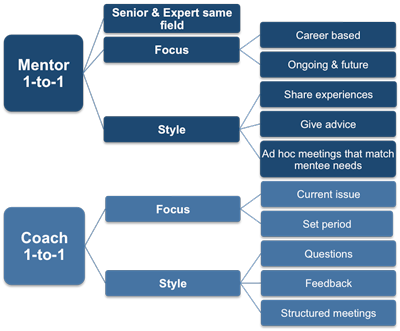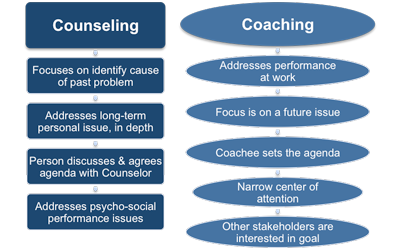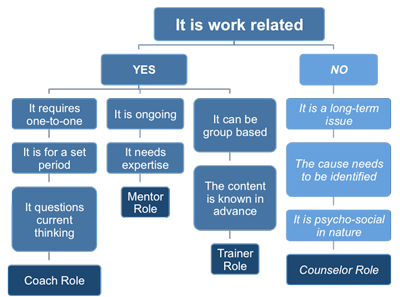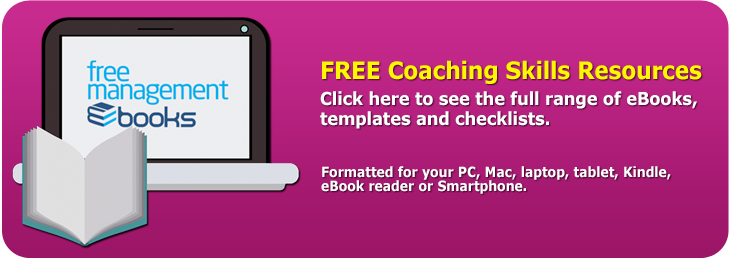Differences Between Coaching and Mentoring
Managers need to have a clear distinction between the role of a coach and that of a mentor. This is because the nuances are subtly different in terms of the behaviors required by the manager to be successful in each role.
They are both one-to-one conversations aimed at facilitating professional development, but a mentor is usually a more senior person working in the same field as the person being mentored and this enables them to share experience and dispense advice.
 |
The mentee will be seeking to develop their career through the mentoring process on an ongoing basis. The advice and expertise they seek from the mentor will be broad based, with the objective of developing the individual for future roles both on a career and personal level. By its very nature the relationship will be a long-term one and meetings or discussions will be convened on an ad hoc basis to meet the needs of the mentee.
In contrast, a coach does not typically pass on experience or give advice, but rather uses questions and feedback to facilitate the coachee's thinking and practical learning. Even though coaches are often senior to the coachee, this does not have to be the case and nor do they have to be an expert in the coachee's field.
The coaching will be focused on a current issue or development area in the workplace that must be addressed within a defined period. Whilst an individual's personal development may occur during the coaching this is not its main aim. The focus is work-based not personal. The meetings will be structured and scheduled to fit into the required timeframe.
Whilst it is rare for a manager to offer long-term counseling to a member of their team, there are often situations that occur in the short term that they can address. So it is important that you appreciate the different behaviors you need to portray when you need to assume the role of counselor.
Such situations usually relate to a fundamental or drastic change in an individual's personal circumstances - for example, divorce, death, or serious illness.
 |
Coaching and counseling share many core skills and both of these activities are one-to-one conversations; however, their tone and purpose are very different:
1. Coaching addresses workplace performance, whereas counseling usually addresses personal issues.
2. Coaching invariably focuses on a specific future issue, whereas most forms of counseling focus on the past and are in depth.
3. Coaching and counseling are both usually short term in nature. But counseling often becomes long term by virtue of the fact that it focuses on personal issues.
4. The coachee sets their own agenda, but an individual receiving counseling will discuss and agree the agenda with the counselor.
5. The goal for coaching is targeted at improving an individual's performance at work, whereas with counseling the aim is to help the person understand and identify the root cause of their long-term performance problem or work issue.
In addition to these points there are some things that only relate to either coaching or counseling alone. Firstly, when coaching an individual there will be other stakeholders who are interested and who need that person to develop the required skill or competency. These stakeholders may be co-workers, customers or suppliers. There are rarely any stakeholders involved when someone is undergoing counseling. Secondly, only counseling can address psychological and social issues that are affecting a person's performance.
By asking a few simple questions you can quickly identify the role required to address the situation presented to you. In some instances you may decide that the best way to help an individual is to call on an expert, for example a qualified counselor.
 |
Now that you appreciate the different circumstances and behaviors of the four learning roles you will be able to develop your coaching skills so that you can become a competent coach for your team.
You may also be interested in:
Coaching Management Style | Management Coaching Skills | Differences Between Coaching and Training | Internal and External Coaches - Advantages and Disadvantages | Formal and Informal Coaching | Coaching Skills for Managers | Successful Coaching Skills.



